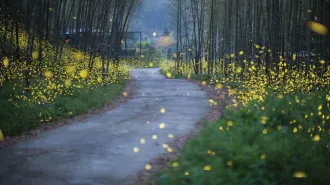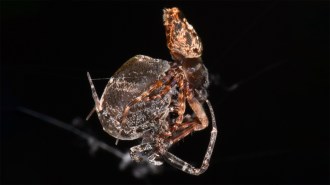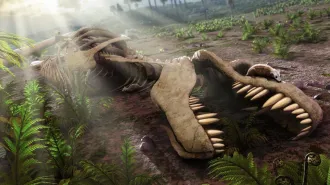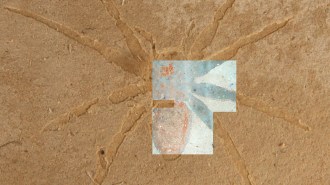All Stories
-
 Animals
AnimalsWhy you should care about ‘The Insect Crisis’
A new book explains why insect populations are dwindling and why that’s a problem.
-
 Tech
TechThis camera lens can focus up close and far away at the same time
Inspired by the eye of an extinct trilobite species, the large depth of field can help with imaging techniques to create 3-D photos.
By Anna Gibbs -
 Animals
AnimalsThese male spiders catapult away to avoid being cannibalized after sex
In a leap for survival, male Philoponella prominens spiders leverage hydraulic pressure to extend leg joints and fling themselves off hungry females.
-
 Life
Life‘The Last Days of the Dinosaurs’ tells a tale of destruction and recovery
A new book takes readers back in time to see how an asteroid strike and the dinosaur extinction shaped life on Earth.
By Sid Perkins -
 Physics
PhysicsGravitational waves gave a new black hole a high-speed ‘kick’
Ripples in spacetime revealed that two black holes united into one, which then sped off at around 5 million kilometers per hour.
-
 Paleontology
PaleontologyGlowing spider fossils may exist thanks to tiny algae’s goo
Analyzing 22-million-year-old spider fossils from France revealed that they were covered in a tarry black substance that fluoresces.
-
 Particle Physics
Particle PhysicsThe Large Hadron Collider has restarted with upgraded proton-smashing potential
Physicists will start taking data this summer once the revamped Large Hadron Collider gets up to full speed.
-
 Particle Physics
Particle PhysicsMuons spill secrets about Earth’s hidden structures
Tracking travel patterns of subatomic particles called muons helps reveal the inner worlds of pyramids, volcanoes and more.
-
 Health & Medicine
Health & MedicineWhat experts told me to do after my positive COVID-19 at-home test
Rapid at-home tests mean many COVID-19 cases go unreported, but they’re a great tool for deciding when to leave isolation. I found that out firsthand.
By Anna Gibbs -
 Health & Medicine
Health & MedicineWhy taking medications during pregnancy is so confusing
It's hard to know what new drugs are safe when medical research excludes pregnant people.
-
 Astronomy
Astronomy‘Goldilocks’ stars may pose challenges for any nearby habitable planets
Orange dwarfs emit far-ultraviolet light long after birth, stressing the atmospheres of potentially life-bearing worlds.
By Ken Croswell -
 Planetary Science
Planetary ScienceU.S. planetary scientists want to explore Uranus and Enceladus next
A report on recommendations for the next 10 years of U.S. planetary science prioritizes sending an orbiter to Uranus and an “orbilander” to Enceladus.
By Liz Kruesi